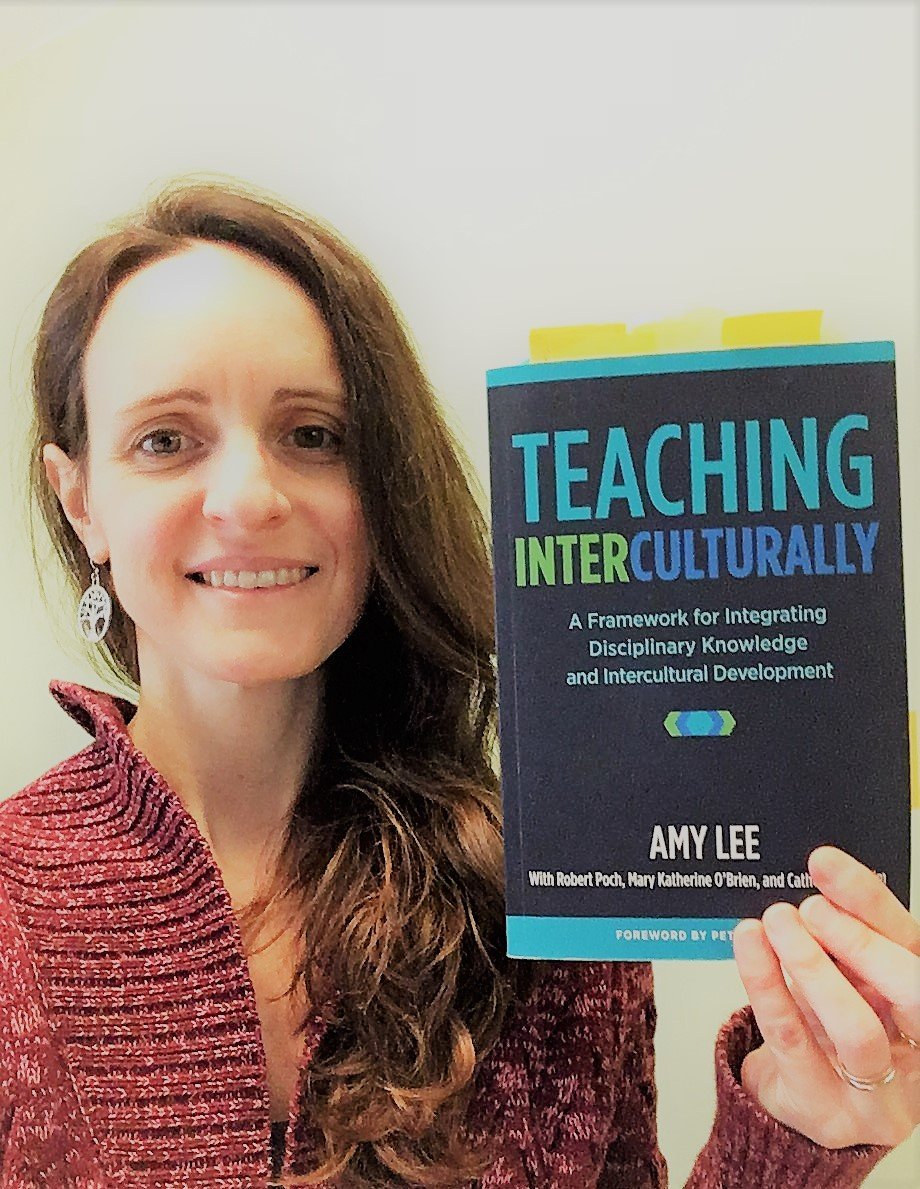Committee Corner: LEO Inclusive Teaching Questionnaire Summary
Grace Helms-Kotre holds up a book about Inter-cultural teaching.
Among the contract gains made this year are the expansion of Inclusive Teaching Professional Development Fund (ITPD) and the addition of the Annual Lecturer Excellence in Inclusive Teaching Award. The Provost office on each campus will develop the criteria for the Inclusive Teaching Award. We expect that work to be completed in the Winter 2022 term. Once it happens, we will share the necessary information with lecturers so you can apply.
The Inclusive LEO committee has been looking at ways to help lecturers apply for ITPD funds and encourage participation in CRLT’s Inclusive Teaching Program for Lecturers in Ann Arbor. To that end, we will hold an Inclusive Teaching Roundtable on January 28, 2022, 12-1 pm on Zoom to spotlight a few colleagues’ experiences with the funds, to answer any questions about potential projects with the funds, and hold an open discussion on inclusive teaching pedagogy.
We also surveyed around 100 past participants of both programs to gather information on the types of projects that were funded and lecturers’ experiences working on them. We heard from 14 lecturers, 13 in Ann Arbor and 1 in Dearborn.
We are happy to report that most respondents have had a positive experience with the funds. Applying for the programs was relatively seamless and the outcomes were well worth the effort. In addition, the types of projects funded vary widely and will have diverse and important impacts on teaching and learning. Below are some of the survey responses.
Types of projects funded:
“In a series of interviews, we will record students’ experiences in language program classrooms and curriculums (both language and in culture courses), in particular as they relate to the following two of CRLT’s principles of inclusive teaching: Critical engagement of difference and Academic belonging.” (funding was used to pay stipends to student participants)
“Lecturer book study group on Teaching Interculturally by Amy Lee (stipend for study time and books).”
“I used most of the money for skill development (i.e., to compensate me for my time) to learn about accessible, inclusive online teaching and to delve into disability studies literature while designing a new course. However, I also bought several books related to disability studies and to the course I was designing.”
“The textbook, which many people consider the best in the field, is really lacking in diversity and is often BAD about subjects such as African American Vernacular English. I proposed supplementing the syllabus.”
“[Made changes to the course syllabus] to use disability and social justice praxes frameworks for course assessment, attendance, and revisions policies.”
Question: Did the grant help you realize the goals you had when you applied?
“Yes, very much so. We had 13 meetings, 3 of them long meetings with students, we found out important information about exclusion of BIPOC students in the language programs, and are about to submit a groundbreaking report to LSA and the language programs.”
“Yes, it did. I did not enjoy teaching online but knew I would need to get better at doing so and at doing so inclusively, rather than waiting for a student to ask for accommodations. The grant motivated me to take the four Coursera courses to work on this, which I would not have done otherwise. A couple of them overlapped with each other, but overall I did learn useful lessons and concepts.”
Question: Did your participation in the CRLT process help you to realize your original innovation objectives, and/or did it help you develop and implement new, possibly better objectives? Either way, please explain.
“My objectives haven't changed, but the program has helped me discover some better ways to implement those goals.”
“Absolutely. I learned a tremendous amount, both from readings, CRLT leadership and from the incredible community forged through the program. I have half a dozen concrete changes I will be making to my course. They vary from changes to the syllabus, assignment descriptions, flexible options, and a very explicit approach to teaching for equity.”
The CRLT program requires that applicants have some prior experience in inclusive teaching. We asked participants what that experience entailed and here are some responses:
“Quite a lot, including previous experience with CRLT inclusive teaching training as a grad student consultant and teaching certificate recipient; additional attendance at discipline-specific pedagogical workshops focused on inclusive teaching.”
“None other than teaching students of diverse backgrounds particularly in the first year and transfer student writing.”
“I attended several workshops put on by CRLT, both asynchronous and synchronous.”
Finally, when respondents were asked to provide advice to Lecturers who might be considering applying for one of these programs, most of the respondents encouraged others to apply. One participant wrote: “Be creative! My sense is that the funding committee is very eager to fund these projects, so find something that will benefit you/others and go for it.”
The deadline for applying to the Inclusive Teaching Professional Development Fund varies per campus.
In Dearborn, applications are accepted on a rolling basis until May 15, 2022 (apply here).
Ann Arbor has a deadline of May 15th (apply here).
Flint will be reviewed January 28th, March 25th, June 10th, September 16th, and November 14th (apply here).

